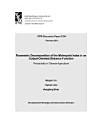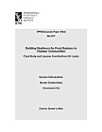Improving household consumption and expenditure surveys’ food consumption metrics: Developing a strategic approach to the unfinished agenda
Fiedler, John L. · Mwangi, Dena M.
نوفمبر 2016 · IFPRI Discussion Paper الكتاب 1 · Intl Food Policy Res Inst
كتاب إلكتروني
88
صفحة
family_home
مؤهل
info
reportلم يتم التحقّق من التقييمات والمراجعات. مزيد من المعلومات
معلومات عن هذا الكتاب الإلكتروني
As the nature of global malnutrition changes, there is a growing need and increasing urgency for more and better information about food consumption and dietary patterns. The past two decades have seen a dramatic increase in the number, availability, and analysis of the food consumption data collected in a variety of multipurpose household surveys, referred to collectively as household consumption and expenditure surveys (HCESs). These surveys are heterogeneous, and their quality varies substantially by country. Still, they share some common shortcomings in their measurement of food consumption, nutrient intakes, and nutrition status that undermine their relevance and reliability for purposes of designing and implementing food policies and programs. This review crafts a strategic approach to the unfinished global agenda of improving HCESs’ collection of food consumption data. Starting with the priority studies recommended by a 100-country HCES review (Smith, Dupriez, and Troubat 2014), it focuses on a strategic subset of those studies that deal most directly and exclusively with the measurement of food, and that are of fundamental importance to all HCES stakeholders in low- and middle-income countries. Drawing from the literature, this study provides a more detailed, more circumspect justification as to why these particular studies are needed, while identifying key hypotheses, explaining why these studies are of growing urgency, and demonstrating why now is a propitious time for undertaking them. The review also identifies important study design considerations while pointing out potential challenges to successful implementation stemming from technical capacity, economic, administrative, and political considerations. Six key studies are rank ordered from a global perspective as follows, taking into account (1) the likely shared consensus that a topic is an important source of measurement error in estimating consumption; (2) the perceived urgency of the need for addressing a particular source of measurement error; (3) the perceived likelihood of success—that is, that the efforts will improve the accuracy of measurement; (4) whether or not the study entails modifying the questionnaire; (5) the ease with which a study may begin; and (6) the extent to which the study is independent of necessary negotiations with existing HCES stakeholders because of the types of changes it is likely to entail (in either the questionnaire or the way the data have traditionally been processed).
تقييم هذا الكتاب الإلكتروني
أخبرنا ما هو رأيك.
معلومات القراءة
الهواتف الذكية والأجهزة اللوحية
ينبغي تثبيت تطبيق كتب Google Play لنظام التشغيل Android وiPad/iPhone. يعمل هذا التطبيق على إجراء مزامنة تلقائية مع حسابك ويتيح لك القراءة أثناء الاتصال بالإنترنت أو بلا اتصال بالإنترنت أينما كنت.
أجهزة الكمبيوتر المحمول وأجهزة الكمبيوتر
يمكنك الاستماع إلى الكتب المسموعة التي تم شراؤها على Google Play باستخدام متصفح الويب على جهاز الكمبيوتر.
أجهزة القراءة الإلكترونية والأجهزة الأخرى
للقراءة على أجهزة الحبر الإلكتروني، مثل أجهزة القارئ الإلكتروني Kobo، عليك تنزيل ملف ونقله إلى جهازك. يُرجى اتّباع التعليمات المفصّلة في مركز المساعدة لتتمكّن من نقل الملفات إلى أجهزة القارئ الإلكتروني المتوافقة.







